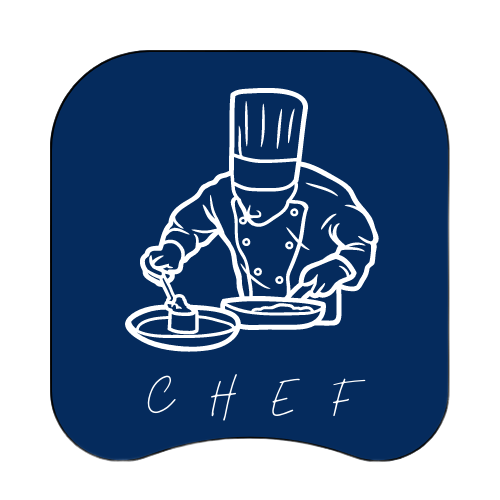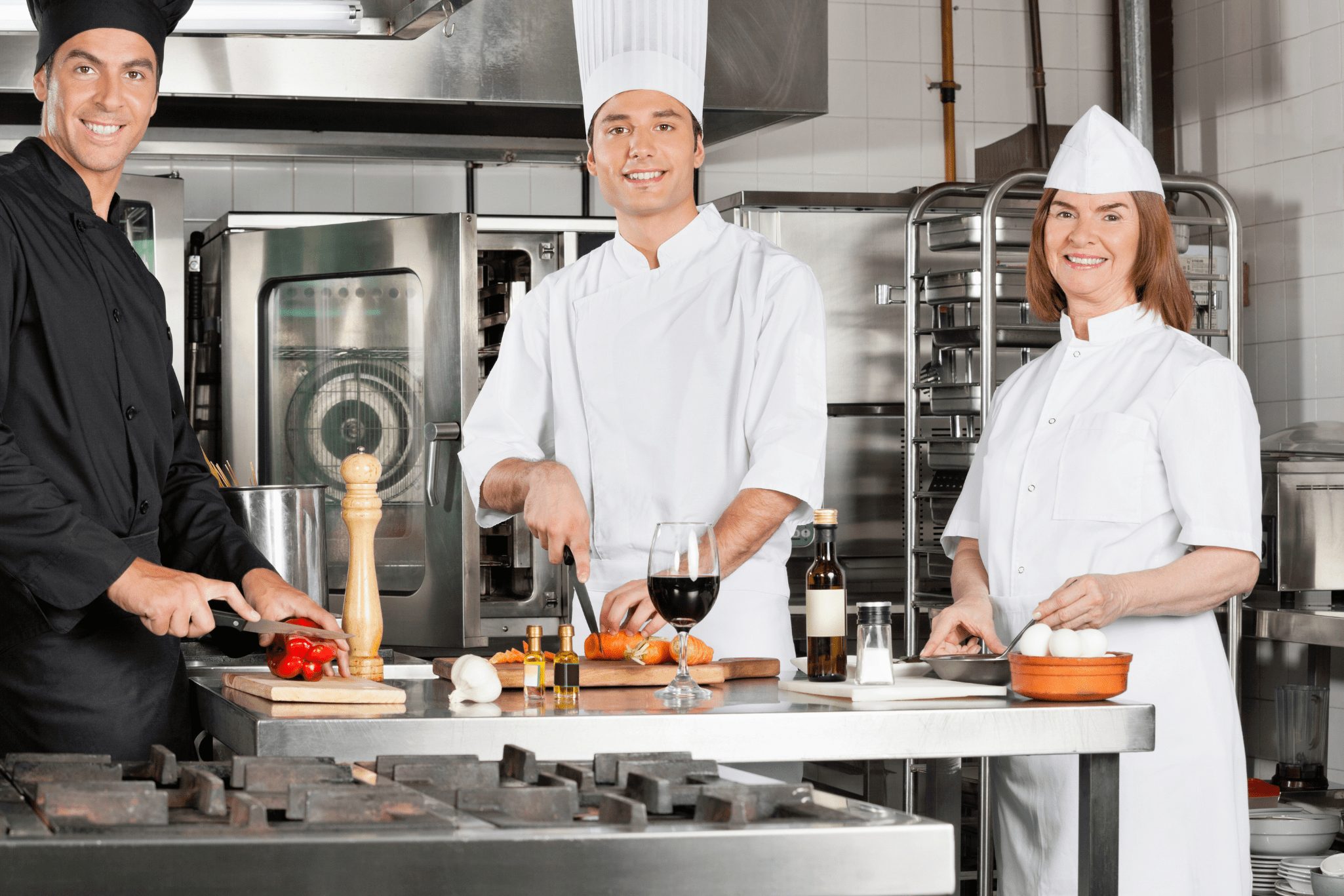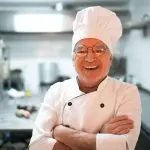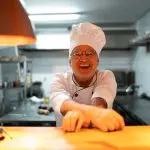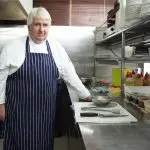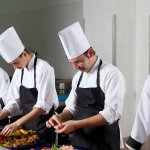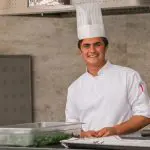A chef is a professional cook who is proficient or masterful at professional-level food preparation. Often specialising in a particular type of cuisine, though many use their expertise to create fusion recipes.
Chefs are at the top of the kitchen hierarchy (which we’ll explain shortly). And so design menus, run the kitchen, and make the important decisions about the food a restaurant serves.
Often in partnership with a restaurant or hotel owner or manager, though many own their own restaurant.
Want to skip ahead?
- Is a cook a chef
- A cooks job description
- A job description
- What do you call an apprentice
- What type of job is this
- Is this a good career
- What to study
- Frequently Asked Questions
What is a Chef? Job Description, Types of Chef and How to Start
Whether you’re just curious about what they do or are thinking about starting a new career. Read on to find out what a chef is and what being one entails.
What is a Chef? And The Meaning
If you’ve never eaten in a fancy restaurant where the chef is the (usually unseen) star of the show, the title “Chef” may be a little ambiguous to you.
While anyone chopping vegetables in their kitchen at home can causally call themselves a chef, a professional has a specific set of skills and experience.
Is a Cook a Chef?
If we’re talking in a professional context and not just making jokes in our home kitchens.
Then all chefs are cooks, but not all cooks are chefs. A cook is simply anyone who prepares food in a professional context.
So that includes people working in school and care home kitchens. These cooks are still skilled, but their skill levels, experience, and duties are different. A chef de rang is not a chef in a kitchen brigade.
What is a Cook’s Job Description?
As we just discussed, “cook” is actually quite a vague term, and so their exact job description will vary from role to role. On the whole, it’s a cook’s job to prepare meals for customers, students, or employees.
Some cooks will mainly be heating up preprepared food and assembling it, while others will start from scratch with raw ingredients, more like a pro.
Cooks are usually working to meet a specific schedule, such as serving dinner to students at noon. Whereas chefs prepare food for customers who order when they arrive at the restaurant.
What is a Chef’s Job Description?
A true job description includes recipe creation, menu development, managing and overseeing the kitchen. Some are very hands-on in the kitchen, assisting their team with food preparation from start to finish.
While others take on more of a managerial and quality control role. Their primary goal is to deliver outstanding food at volume in a relatively short period of time.
Is a Chef a Skilled Worker?
Yes; it takes years of training, especially in well-respected restaurants. Apprentice’s can either attend culinary school to learn the skills and knowledge they need to start their career. Or they can work their way up the ranks while working, starting at the very bottom.
There are no shortcuts it simply takes years of experience.
What Do You Call an Apprentice?
While the exact terms used vary depending on the restaurant or institution, an apprentice is usually called a “Commis”. A Commis is a recently qualified chef or one who is still actively undergoing training.
The next step up is a “Chef de Partie”, also known as a Line Cook or Station Cook. It’s the Chef de Partie’s job to prepare ingredients. Some large kitchens have multiple CDP’s, each with a Commis or kitchen assistants working under them.
A CDP is promoted to the level of a “Sous Chef”, which is the second-in-command in the kitchen, second only to the Chef. They take on many of the roles of a Chef, such as managing staff schedules and leading the kitchen on the Chef’s days off.
Finally, chefs reach the official Chef title, which is also known as:
- Chef de Cuisine
- Head Chef
- Executive Chef
- Master Chef
What Type of Job is a Chef?
Chef jobs are practical, active, and creative. Chefs typically work “unsociable” hours, meaning you’ll work a shift between the hours of 10AM and 1AM.
Usually Monday – Sunday. There are other options available, but these hours and days are the most common.
If you’re a Chef de Cuisine, your hours and schedule will be much more in your hands than the more junior team members.
Is a Chef a Good Career?
If you dread the idea of working a 9-5, think that spending every day sitting staring at a screen is boring. And have a passion for food, this career may be the perfect job for you.
To have a long and fulfilling career, you’ve got to love cooking and the creativity it offers.
If you enjoy the process of preparing meals just as much as you do eating them and enjoy cooking for others, consider if you’ll enjoy the working environment.
A working kitchen is a fast-paced place to be, where tempers (and temperatures!) can get heated. And you’ll always be on your feet.
Of course, there are benefits to that – you’ll never be bored, especially at the higher levels. And there are plenty of documented health benefits to being on your feet.
Many night owls also find the late working hours (starting late and finishing late) suit them down to the ground.
In terms of career progression, those looking for more pay and esteem will need to look into getting a position at a top restaurant. Once you’re skilled, you’ll also have the option of more entrepreneurial pursuits, if that’s something that interests you.
While most Heads will make £30,000 – £60,000 per year, there are celebrity chefs and influencers that make much more than that!
What to Study
You’ve got two key entry points; you can start working and work your way up the ranks, or you can go to culinary school. Which route you decide to take will ultimately depend on where you see yourself and the resources available to you.
Do you want to be at top of a kitchen brigade in a restaurant in London, or do you see yourself living in the country running a food-focused pub? Do you have the time and money to invest in full-time or part-time education, or do you want or need to get into a role and start earning?
The acclaimed Cordon Bleu Culinary Arts School in London has a wide range of programmes, so a browse of their programmes will give you a better understanding of what options are available to you if you’re serious about this career.
This is a great career choice for someone who wants to work with their hands, express their creativity, and have a night owl-friendly work schedule.
Whether you want a relaxed career in the country or have your sights set on celebrity stardom. This can be a deeply satisfying and life-long career.
Frequently Asked Questions For The ‘Chef’ Role
What Is A Chef?
A chef is a trained professional skilled in preparing, cooking and presenting foods. Working in restaurants, hotels and a range of food service establishments.
What Does A Chef Do?
Responsibilities of the chef include; planning menus, plating dishes, managing kitchen staff and ensuring food quality and consistency.
What Are The Types Of Chefs?
Positions include;
- Executive
- Head
- Sous
- Chef de Partie
- Commis
How Do You Become A Chef?
- Formal Training
- Apprenticeships
- Gaining Experience By Working In Kitchens
What Skills Are Needed?
Key Skills Include;
- Culinary Knowledge
- Creativity
- Time Management
- Leadership
- Attention To Detail
- Multitasking
What Is The Difference Between A Cook And Chef?
A chef will typically have formal training, leadership responsibilities, and expertise in culinary arts. While a cook focuses on food preparation and may not require formal training.
Do Chefs Specialise In Specific Cuisines?
Yes, specialities can include: Italian, French, Japanese or others. Others may focus on dietary requirements such as vegan or gluten free.
What Tools Are Used In The Role?
Tools like knives, cutting boards, thermometers, pans, and specialised equipment such as a thermomix or sous-vide machines.
What Is The Career Path?
Typical paths include:
- Commis (Entry Level)
- Sous (Second in Command)
- Executive (Head of the Kitchen)
- Opening A Restaurant
What Challenges Are Faced?
Common challenges include long working hours, high pressure environments, maintaining food safety standards, managing costs, and adapting to customer preferences.
